
May - June 2002
Vol. 13, No. 3 | Contents
|
RB: People |
Komen Foundation Wins | |
| Bronfeld takes the Big Dog | ||
| Sacco Fan | ||
| Charlie Russell Passes | ||
| North Carolina Honorees | ||
| Galbreath takes Head Coach position | ||
| EXTRA: Full Text, Houston's "Ballyhoo Shootout" | ||
| EXTRA: New York State Doubles (online only) | ||
| EXTRA: West Michigan Open (online only) |
by Jean Gallagher
 This year’s Racquet for the Cure Tournament
was a huge success when — thanks to all our sponsors and players — we were
able to bring in $3000.00 for the Susan G. Komen Foundation. A total of 56
women participated, making this the largest single-day tournament so far.
Thanks to Lakewood Athletic Club and its 12 courts, we were able to fit all our
games into a Saturday filled with fun and laughter, not to mention sweat and
fatigue!
This year’s Racquet for the Cure Tournament
was a huge success when — thanks to all our sponsors and players — we were
able to bring in $3000.00 for the Susan G. Komen Foundation. A total of 56
women participated, making this the largest single-day tournament so far.
Thanks to Lakewood Athletic Club and its 12 courts, we were able to fit all our
games into a Saturday filled with fun and laughter, not to mention sweat and
fatigue!
We kicked off with an exhibition match between top-ranked pros Kersten Hallander and Rhonda Rajsich (shown left, L-R), who gave it their all, and didn’t let up for anything. You’d have thought they were playing at the U.S. Open! It’s hard to get a ball past Rhonda, who dove repeatedly to keep the ball in play. Kersten played strong and came through in the fifth game for the win. But the most fun was in the stands, after Jo Shattuck started “the wave” every time one of the players dove!
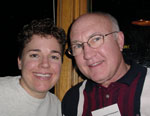 |
| Carol Zimlinghaus & photographer Dan Davis |
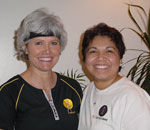 |
| Nila Gresham Cole & Jessie Carbajal |
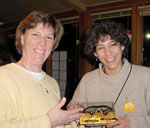 |
| Organizer Marcia Richards presents a prize. |
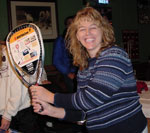 |
| A happy winner! |
For the rest of the players, this playoff format is a departure from the norm. First, we set up designated teams, distributing all levels of play equally on each team. With a total of ten teams, we divided half into “Team Rajsich” and the other half as “Team Hallander.” This allowed any players needing help with their game to go to their “coach” for advice throughout the day. This was also a way to get to know “your” pro.
Singles matches were played to 11, best of three. The Open/A doubles matches were played one game to 21. We included a B/C doubles this year, allowing the lower levels to get some time on the court with a partner, and scheduled it in a shuttle format, five games for ten minutes, with Team Hallander’s playing against Team Rajsich’s. After the rounds were complete, the number one spots played each other, the number two’s played each other and so on. Everyone survived (no one got hit with a racquet or a ball) and a lot was learned in this hour of fun.
All day long, there were “Test Your Skills” events with prizes to the most accurate players. Targets were set up to hit with a drive serve, a lob serve, or a pinch, along with many others that Marcia Richards conjured up. Players wonwhatever prize was in the target. By the end of the day, as players were being eliminated, they decided to test their skills on the court with a pro. This event paired you with a pro to play a doubles game. Kersten and Rhonda adapted their games to fit the level of the players, sometimes even playing left-handed.
Even though everyone was exhausted, we all managed to drag ourselves over to the nearby Old Chicago for our dinner and awards party. The 85 in attendance at dinner were just another testament to how well this event had gone. Not a soul left without an award for something. Tasha Morris, a professional kick boxer recovering from breast cancer, was our guest speaker, and gave a heartfelt speech that left us all amazed at her recovery. We’d like to thank her for her time and sharing her personal life with us. Not to mention the fact she got on the court and actually played racquetball! She took a few pointers from Kersten and we look forward to her entering the tournament next year.
Thanks to all the guys that helped out during the day ... Bruce Burgess, Adam Katz, Dan Davis, Steve Nelson, and Larry Mullen to name a few. They helped run the tournament desk, took pictures, answered any questions throughout the day, ran the pro events and even stepped on the court for a few rallies with Kersten and Rhonda. Their support was overwhelming, along with that of the tournament committee and sponsors, who made the marathon day worth all the effort.
We were able to meet many new players and get to know the ones that we’ve seen before. A special thanks to out to LPRA regulars Kersten and Rhonda for sharing their time and talents with Colorado locals. We enjoyed learning more about them as individuals.
So the next time you dive on the court and the crowd starts the wave, hopefully it will remind you of the “Racquet for the Cure” and bring a smile to your face.
by Ken Fichthorn
Top
The Men’s Open singles originally featured John Ellis as the favorite, but he withdrew due to a family emergency just hours before his first match. That shake up left the $1,250 first prize up for grabs by remaining top seeds Bronfeld, Chris Crowther, Kelly Gelhaus, and Greg Solis. Ultimately young Juan Herrera would send one of those seeds home early in a surprise upset.
Bronfeld said he had “several lousy practices leading up to the tournament,” but he looked fine once he got started against hard-hitting Dave Garcia. Bronfeld beat Garcia 15-4, 15-7, then throttled Joel Koppel 15-5, 15-3 and disposed of Greg Solis 15-3, 15-7 to reach the final.
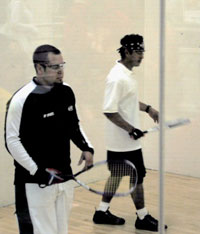 |
| Doubles champs Jonathan Dunn & Greg Solis |
On the other side of the draw, Chris Crowther advanced to face Juan Herrera, after defeating Juan’s brother, Andres, just hours before. Herrera took the first game 15-13. Hearing the wake-up call, Crowther came out and destroyed Herrera, 15-2, in the second game. Crowther also led the tiebreaker 10-6, but Herrera clawed his way back to avenge his brother’s earlier defeat, edging out Crowther in an 11-10 tiebreaker.
Bronfeld’s opponent in the final would be determined by another tiebreaker involving Herrera. Former ranked pro Kelly Gelhaus defeated Herrera 15-5 in the first game, using mainly high lob serves to the forehand side. Herrera won a close second game 15-14, but Gelhaus won the tiebreaker 11-1 using hard Z serves, again to Herrera’s forehand. All in all, not a bad showing for Herrera.
Kelly Gelhaus’ earlier tiebreaker matches (three of them) may have slowed him down in the final. Against Bronfeld, he didn’t mount much of an offense, as Bronfeld won both games 15-7, thus going the entire tournament without giving up more than seven points in a game. With crisp shots, and nearly flawless play, this was as well as Bronfeld has ever played.
When asked how he would have fared against John Ellis, Michael said simply, “it would have been interesting.”
Open Results — Men’s Open Singles: Michael Bronfeld def. Kelly Gelhaus, 15-7, 15-7; Womens Open Singles: Mary Tessier def. Lisa Hjelm 9-15, 15-11, 11-4; Mens Open Doubles: Jon Dunn/Greg Solis def. Michael Bronfeld/Marko Perez 15-12, 4-15, 11-9; Womens Open Doubles: Mary Tessier/Elaine Dexter def. Lisa Hjelm/Kari Gardner 15-13, 14-15, 11-9; Mixed Open Doubles: Jon Dunn/Janel Tisinger def. Elaine Dexter/Mark Nomura 15-12, 15-11.
by Junko Geddes
Top
His teaching extends beyond the rules of the sport, it conveys the code of life and of humankind. He is the mentor to the students and the adults who uses the facility of the college. I think that what makes Mr. Sacco such giant (he is a very slightly built man) is his attitude toward everything in life.
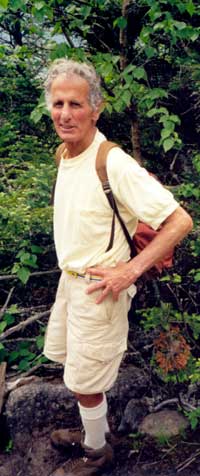 According to the citation of St. Lawrence
University’s Athletic Hall of Fame, Mr. Sacco captained for both football and
baseball and was the defensive captain (and MVP) of the 1949 football team
which won the last six games of a season that set the stage for a fourteen game
win streak which included an unbeaten 1950 team. He also led the 1948 baseball
team in hitting with a .310 average and captained the 1951 team. He was an
assistant baseball and football coach for SLU while attending graduate school.
According to the citation of St. Lawrence
University’s Athletic Hall of Fame, Mr. Sacco captained for both football and
baseball and was the defensive captain (and MVP) of the 1949 football team
which won the last six games of a season that set the stage for a fourteen game
win streak which included an unbeaten 1950 team. He also led the 1948 baseball
team in hitting with a .310 average and captained the 1951 team. He was an
assistant baseball and football coach for SLU while attending graduate school.
He started playing racquetball in his early sixties, was awarded the USRA’s Age Group Athlete of the Year award in 1996 and was inducted into the MNRA Hall of Fame in 1997. He’s won twenty gold medals and twelve silver medals in international singles and doubles — and he’s still competing regularly.
His superb physical condition, which obviously is the result of his life-long dedication to athletics, is envied by all of us who play racquetball or tennis with him.
After a few games, while the rest of us are panting and being drenched with sweat, Mr. Sacco’s breathing remains unlabored and his hands turn ice cold. Regarding his cool composure after several hard games, men would half admiringly and half teasingly say, “He breathes only every other Tuesdays. Today is not Tuesday, so, he is not breathing today,” and about his icy hands after the games, “He is dead! But, he doesn’t know it himself!”
A young man once told me, in awe, about his experience with Mr. Sacco, “While I was playing racquetball with Vic, he crashed hard into a wall and dislocated his shoulder. Then he just rammed his dislocated shoulder against the wall a couple of times, put it back in place, swung his arm to loosen it a bit and continued on playing as if nothing had happened. He had several major surgeries on his both knees and both shoulders. Any one of them would put any man out of commission. But, he is still competing in national and international tournaments. I’m telling you that man is really something, nothing will stop him.”
Mr. Sacco is also known as being compassionate and soft spoken. I once asked him, “Vic, you are always so gentle that I cannot imagine you being angry, have you ever lost temper to anybody?”
He paused a moment, then said, “I cannot tolerate dirty plays. It doesn’t matter whether the player is in my own team or in the other. When I was a captain, one of my teammates made a really dirty play that resulted in the injury to a player in the other team. He seemed to be pleased with himself because he got away with it and his teammates congratulated him. But, I went up to him and said, ‘You know you really didn’t have to do it. It was uncalled for.’ The player was shocked. He thought that he helped his team and did not expect to hear such criticism from me,” he continued. “You know, in sports, one exerts his skill, his strength, his speed and is demanded to make decisions in the split of a second. In the arena of sports, a man must shine, winning is not the goal, depicting his best is. Playing sports must be fun. Just go out there and have a good time.”
And having a good time is exactly what we’re doing — playing racquetball with Mr. Sacco, at SUNY Potsdam.
Courtesy George Spear
Top
 To inform us of the passing of longtime friend
Charlie Russell earlier this year, George Spear shared this photo of himself
(far left), and pals Harry Steinman, and Charlie Russell.
To inform us of the passing of longtime friend
Charlie Russell earlier this year, George Spear shared this photo of himself
(far left), and pals Harry Steinman, and Charlie Russell.
Russell passed away January 28, at the age of 83. He was a retired Captain in the U.S. Navy and served his country as a Navy pilot in WWII and the Korean War. Married to wife Marion for 55 years, Russell was also father to eight, grandfather to sixteen, and an avid racquetball player. Steinman also passed away last year.
Spear suffered a stroke in May of last year but says he’s “coming along pretty good.” He has been on the courts a few times, but admits that it’s still a little rough. He hopes to compete in the IRF World Senior Championships this September in the 85+ age division. We’ll be on the lookout for him!
by Lynn Stephens
Top
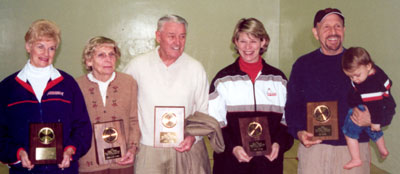 Inducted into the NCRA Hall of Fame were Mary
Low and Earl Acuff, Kevin Armbrecht, Mike Dimoff, Mildred Gwinn, Janet Myers,
Ed Remen, and Paul Saperstein. Receiving the Athletes of the Year awards were
Eddie Alberty and Debra Bryant. The Sportsmanship Awards went to Meena Evans
and Mike Bourgeois. One of the highlights of this very special evening was the
presentation of the Contributor Award. It is given to an individual that helps
to promote and further the sport of racquetball and truly possesses a love for
the game. This year’s winner was Jan Stelma. Stelma is the owner of Courts
Plus, former NCRA president, and current USRA board member. The award will now
be known as the Jan R. Stelma Contributor Award. [< Shown L-R: Gwinn,
Acuff(s), Myers & Remen(s)]
Inducted into the NCRA Hall of Fame were Mary
Low and Earl Acuff, Kevin Armbrecht, Mike Dimoff, Mildred Gwinn, Janet Myers,
Ed Remen, and Paul Saperstein. Receiving the Athletes of the Year awards were
Eddie Alberty and Debra Bryant. The Sportsmanship Awards went to Meena Evans
and Mike Bourgeois. One of the highlights of this very special evening was the
presentation of the Contributor Award. It is given to an individual that helps
to promote and further the sport of racquetball and truly possesses a love for
the game. This year’s winner was Jan Stelma. Stelma is the owner of Courts
Plus, former NCRA president, and current USRA board member. The award will now
be known as the Jan R. Stelma Contributor Award. [< Shown L-R: Gwinn,
Acuff(s), Myers & Remen(s)]
Membership in the NCRA has increased 37% in the past two years to nearly 600, vaulting it to 10th in the country. North Carolina also boasts one of the largest junior programs in the country. “I was honored to present these awards to these very deserving people,” said Lynn Stephens, president of the NCRA. “We need to recognize these people who have played important roles in the growth of racquetball in our state.”
Top
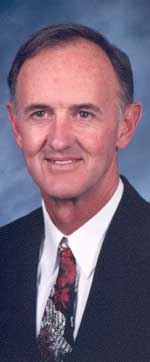 Ron Galbreath has accepted the position of
head coach for the Geneva College women’s basketball team. Galbreath
previously coached the men’s basketball team at rival college Westminster for
25 years where he posted an impressive 448-206 record before retiring in 1998.
Galbreath also has an impressive racquetball record. He has won nine USRA
National singles championships in age-group competition including this past
years 60+ title.
Ron Galbreath has accepted the position of
head coach for the Geneva College women’s basketball team. Galbreath
previously coached the men’s basketball team at rival college Westminster for
25 years where he posted an impressive 448-206 record before retiring in 1998.
Galbreath also has an impressive racquetball record. He has won nine USRA
National singles championships in age-group competition including this past
years 60+ title.
“Racquetball has helped me throughout my coaching career,” Galbreath tells us. “I believe that by playing racquetball it helped to keep me fit and relieve stress.”
Most people might be a little concerned or intimidated with such a big job change — coaching for a rival college and switching from coaching men to coaching women — but not Galbreath. “I’m sure I’ll find out the difference between coaching men and coaching women,” he explains. They’re athletes. I’m me. I’m not going to change the way I coach basketball. They want discipline. They want to work hard.”
<< Galbreath isn’t worried about the change of schools either. “I have been at Westminster for thirty-three years now but Geneva actually gave me my start.” Galbreath was hired as a 26-year-old assistant at Geneva College in 1966. His wife and two brothers are graduates of Geneva college and it is where he has held his basketball camp that has seen over 3700 players go through.
As for racquetball, Galbreath is already gearing up for another national title in Houston and shows no signs of slowing down. “I have been blessed with a lot of good racquetball and a supportive wife. I figure I still got another 20 years of racquetball left.”
New York State Doubles Championships
by John Edwards
[unedited, full text]
Players traveled from all over New York State as well as from places like Washington and Massachusetts. The Men's 30+ division played out as expected with number one ranked local Syracuse favorites Tim Kirch and Steve Hachey limiting the Rochester team of Tom Mastrodonato and Jim Abraham to scores of 9 and 8 in two straight games. Many top ranked teams would topple however as the drama of the event unfolded. In the Men's 40+ division, top ranked Fred Klemperer and Jim Rougeux fell in a tiebreaker to the number four-ranked team of Phil Defalco and Stu Feder. Klemperer and Rougeux would hold their opponents to 10 points in the first game, struggle in the second game and only make it to 7 points in the third game.
Second ranked team of Craig Sambor and Tom Rahn would survive to the finals by beating the number three seed of Reinhart Zimmerman and Nick Legrett. That crowd-pleasing match would come down to 10-10 score in the tiebreaker before Sambor and Rahn would close it out by scoring the final point. In the final match, the righty-lefty combo of Defalco and Fader would play some of the most powerful shots they could to keep pace with their opponents. However, the pace was too fast for the Long Island team who had just finished playing in their other final. They would only score 9 and 11 points in the first two games.
Things would go as anticipated as the rankings proved true in the Men's C division with one of the father-son teams emerging in second place. Phil Markham and his son Chris would challenge Robert Waldman and Robert Katz to the title match. The Markham family, who hail from Herkimer, would provide an exciting match against the older pair from Long Island. In a "breath taker" game, the four would work their way to a 14-14 score before dad and son pulled ahead with the winning point. Game two was the same as both teams once again found themselves in a 14-14 dramatic tie. Although in the early part of the game, Markham and Markham pulled out to a 9-2 lead. Now it was Waldman and Katz pulling out the go ahead win to send this final into a third match. Waldman and Katz, both over 66 years old, would rely on high Z's and ceiling balls to control the pace on their way to an 11-5 victory.
Another Long Island duo of Defalco and Feder were also successful in earning the title for the Men's B division. They would shut down the athletic crowd pleasing playing of Dave Calhoun and Jim Feola by limiting them to only two and 3 points in both games. In the lower bracket, Rick Stone and Mike Alvaro from Elmira, would tangle with Steve and Scott Manship, another father and son team from Massachusetts. The Manship team gave them a scare by pulling up to 12 points in game one and took game two to 14-14 before falling victim to the Elmira duo.
The drama continued as the weekend advanced to the finals for the Men's A division. The number four team of Bill Conz and Chuck Van Horn would come close to an upset as they took the number one ranked team of John Edwards and Rhinehart Zimmerman to three games in the bid for that division final. Conz would rely on his cut-off shots to eventually earn the 15-8 win in game one. In a point for point battle, Zimmerman would begin to fire consistent forehand kill shots as he and Edwards moved to a 15-12 second game win. In game three Zimmerman and Edwards would control and change the tempo, which would lead them to a final score of 11-8. On the lower bracket, number three-seeded Lanny Kinner and Scott Picket defeated number two-seeded Mark Clary and Nick Legrett. The Syracuse, Albany combo of Kinner and Picket would dominate with momentum and restrict Clary and Legrett to 11 and 5 points respectively. In an intense final round, Kinner and Picket would fall in two games to the Cortland-Buffalo combo of Edwards and Zimmerman.
In the Mixed division, two members of the Jamaican National Racquetball Team would find themselves in a close match against a Rochester based duo. Number one ranked Jim Green and Donna Renelt would advance to the finals by defeating Mike Osborne and Joy binder 15-10 and 15-2. Number two-ranked John Edwards and Jackie Gopie, members of the Jamaican team, would also advance to the Mixed A's finals with a win over Bruce Mayberry and Wendy Hildmann with scores of 15-9 and 15-6. In the championship round, each team would play to win in what proved to be another point for point battle. Green and Renelt would eventually inch forward to a 15-13 first game win. Gopie, who traveled in from Washington, would move her team forward with a series of Ace serves and earn a chance to go to the tiebreaker with a score of 15-12. In game three, the Jamaicans would continue their run and earn the championship title with an 11-4 win.
In another match that wouldn't be good to watch if you had a weak heart, the Men's Open finals proved to be another dramatic point for point "cliff hanger". The top two ranked teams in that division would make it to the final round. Displaying some of New York's best talent, Jeff Hanno and Brian Berlin would launch into battle against Tim Kirch and Steve Hachey. Game one was a point-by-point trade off until the score was 10-10. Hanno and Berlin would freeze their opponents as they moved ahead to a 15-10 win. Game two saw Kirch and Hachey dominate early to a 12-4 lead. Kirch would use the power of his backhand to keep Hanno and Berlin on the move. The lefty righty combo of Hanno and Berlin would struggle for a one at a time point advancement to a 12-14 score before the partnership of Kirch and Hachey would close the game at 15-12. Game three continued the classic textbook struggle of two distinct and different playing types as Hanno worked to control the pace and placement of the ball while Kirch took advantage of his power and speed. Unforced errors would account for some of the points scored in the tiebreaker before Hachey and Kirch would see their power and pass strategy move them to the 11-6 win.
2001 West Michigan Open reaches new Highs
by Twayne M. Howard
[unedited, full text]
The West Michigan Open is held as a fund-raiser for the West Michigan Juniors Program and they were the biggest winners once again this year. A raffle of Ektelon equipment, lessons, stringing and other donated items raised $300 to support the program. Thirteen Juniors participated only $15 each. Until then, the funds will provide court time, and help Juniors travel to tournaments.
The tournament staff would like to thank our sponsors: The Michigan Athletic Club, Ektelon, AD Design, Perrigo Printing, Mike Anderson at Anderson Screen Printing, Andre Roy, Jim Hamilton, Chris Cole, Dale Brown AND Twayne Howard for the generous contributions. Most of all we'd like to thank all the players who made the trek from Eastern and Central Michigan, throughout the Great Lakes region, and as far away as Missouri. We could not do it without you, and we look forward to seeing each of you next time.
A highlight of the tournament was getting to see the beneficiaries of our efforts as the Juniors took to the courts on Saturday. Several of these players traveled to Junior Regionals last spring with financial support from the West Michigan Open proceeds.
|
Division |
Champion |
Runner-Up |
|
Junior
8 – Under |
Dan
Poindexter |
Trent
Chester |
|
Junior
10 – Under |
Cullen
Dame |
Trenton
Balavitch |
|
Junior
14 – Under |
J.D.
Brown |
Mark
Chester |
|
Junior
16 – Under |
Alex
Brown |
Scott
Lyons |
|
Women’s
Open |
Laura
Patterson |
Felicia
Mann |
|
Women’s
A |
Diana
Courtney |
Barbara
Westveer |
|
Women’s
B/C |
Michele
Poindexter |
PeggyJane
Johnson |
|
Women’s
35+ Open |
Felicia
Mann |
Laura
Patterson |
|
Men’s
Open |
Brandon
Cortese |
Shannon
Kohl |
|
Men’s
A |
Randy
Pagels |
John
Gervasi |
|
Men’s
B |
Tom
Ford |
Michael
Sobczyk |
|
Men’s
C |
Kevin
O’Keefe |
Dan
Whiston |
|
Men’s
D |
Roy
Perovich |
Tony
Gardner |
|
Men’s
19+ Open |
Jake
Cardona |
Brandon
Cortese |
|
Men’s
19+ C/D |
Mark
Bachmann |
Robert
Shurlow |
|
Men’s
25+ A/B |
Andre
Roy |
Jason
Gorski |
|
Men’s
35+ Open |
Bobby
Blacksher |
Chuck
White |
|
Men’s
35+ A/B |
Mike
McMillan |
Attica
Mitchell |
|
Men’s
35+ C/D |
Doug
Flessner |
Jeffrey
Young |
|
Men’s
45+ Open |
Jim
Schenk III |
Rick
Scott |
|
Men’s
45+ A/B |
John
Gervasi |
Joe
Romeo |
|
Men’s
45+ C/D |
Roy
Perovich |
Barry
Dennis |
|
Men’s
55+ Open |
Bill
Hagedorn |
David
Lund |
|
Men’s
55+ Intermediate |
Spark
Overway |
Tom
Sharum |
|
Men’s
Open Doubles |
Brandon
Cortese / Shannon Kohl |
Jeff
Mullins / Augie Pasko |
|
Men’s
B/C Doubles |
Bob
Goodin / Joe Romeo |
Jason
Carroll / Timothy Theisen |
|
Mixed
Open / A Doubles |
Attica
Mitchell / Barbara Westveer |
John
Coaker / Karen Green |
|
Men’s
B/C Doubles |
Mel
Zurack / Lynn Kuczajda |
Twayne
Howard / Diane Kasperlik |
Top | RacquetballMagazine.com | USRA.org
© United States Racquetball Association -- All Rights Reserved